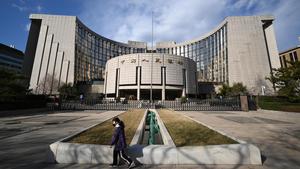 A pedestrian passes the headquarters of the People's Bank of China in Beijing. (ZHANG GANG / FOR CHINA DAILY)
A pedestrian passes the headquarters of the People's Bank of China in Beijing. (ZHANG GANG / FOR CHINA DAILY)
China's central bank vowed on Thursday to further reduce the market interest rates and push financial institutions to forgo 1.5 trillion yuan (US$211 billion) in profit, to boost credit for the business sector and spur economic growth.
Financial institutions could sacrifice a part of their profits through interest rate cuts, the monetary policy tools to directly support credit, and the reduction of some service fees.
Yi Gang, governor, People's Bank of China
"In the second half of this year, the monetary policy is expected to maintain liquidity at a reasonably ample level. For the whole year, new yuan loans are expected to increase by 20 trillion yuan, and the growth of aggregate financing will exceed 30 trillion yuan," said Yi Gang, governor of the People's Bank of China, the central bank.
Financial institutions could sacrifice a part of their profits through interest rate cuts, the monetary policy tools to directly support credit, and the reduction of some service fees, Yi said at the 12th Lujiazui Forum.
The PBOC governor said to pay attention to the "side effects" of policies to cushion the novel coronavirus pandemic. "The total amount of the financial supportive measures should be appropriate, and good timing for an exit of these tools should be considered in advance."
ALSO READ: PBOC to issue 10b yuan bills in Hong Kong
He also mentioned that as an international financial hub, Shanghai can take a step further to free the usage of RMB and achieve the convertibility of capital accounts. "As long as regulatory requirements are met for anti-money laundering, anti-terrorist financing and anti-tax evasion, capital in normal trade and investment can freely float both in and out (of Shanghai)," Yi added.
Guo Shuqing, Party secretary of the People's Bank of China, suggested at the 12th Lujiazui Forum which began on Thursday that countries should be more prudent when coming up with monetary and fiscal policies to boost economy against the COVID-19 epidemic.
Guo said different economies have so far come up with a number of fiscal stimulus packages with unprecedented scale and enforcement. These policies may have strong effect at the very beginning, but there are already signs of the diminishing marginal effect.
"The epidemic may still be alongside with us for a relatively long time. It is still unknown how many economies are planning for new stimulus packages. But it is our advice that regulators should save some room for the future," Guo said.
READ MORE: PBOC steps ensure credit flow to SMEs
"China values very much our regular monetary and fiscal policies. We will not pour cash into the market or adopt monetization of financial deficit. Negative interest rate will neither be implemented," he added.


